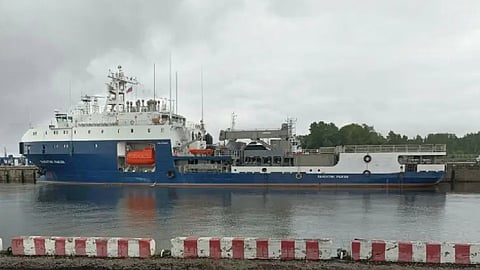VESSEL REVIEW | Valentin Rykov – Russian Navy tanker with emergency response capability
Russia’s Kanonersky Shipyard recently handed over a new replenishment tanker to the Russian Navy. Named Valentin Rykov in honour of a former Soviet Navy submarine captain, the ship belongs to the Project 03182 series of small sea tankers designed by local naval architecture firm Zelenodolsk Design Bureau for the Russian Navy.
Large transport capacity for supporting deployed surface forces
The new tanker will be used primarily for the transport of diesel and aviation fuel and containerised and dry cargo (including food, ammunition, and spare parts) as well as the collection of shipboard waste (such as bilge water and discarded food) in support of deployed Russian Navy vessels. As a replenishment ship, the tanker will help extend the operating range of the navy’s surface combatants, allowing these to conduct operations for sustained periods far from Russian home waters.
Secondary missions will include patrols, transport of personnel, firefighting, salvage, towing of damaged vessels, and search and rescue (SAR). The vessel also has a large aft flight deck for use with Ka-27 multi-role helicopters and unmanned aerial vehicles (UAVs).
Durability for winter navigation
Like its Project 03182 sisters, Valentin Rykov has a length of 78.8 metres (259 feet), a beam of 15.4 metres (50.5 feet), a draught of five metres (16 feet) at full load, a displacement of 3,500 tonnes, a total cargo capacity of 1,350 tonnes, and space for 33 crewmembers and other personnel. An ice-class hull ensures safe navigation in Arctic areas while a high degree of onboard automation allows for a smaller crew complement compared to vessels of similar size.
The propulsion arrangement consists of three 1,600kW diesel generators that drive two rudder propellers via electric motors to deliver a speed of 14.4 knots and a range of 1,500 nautical miles. Alternatively, the vessel can stay out at sea for a maximum of 30 days.
Another two 400kW generators will meanwhile supply electrical power for the onboard systems. A bow thruster is also fitted to provide additional lateral manoeuvrability when berthing/unberthing or navigating in high-traffic areas.
Design work on Valentin Rykov was completed in compliance with Russian Maritime Register of Shipping requirements including Ice class Arc4. The tanker will be operated as part of the Russian Navy’s Baltic Fleet headquartered in Kaliningrad.


